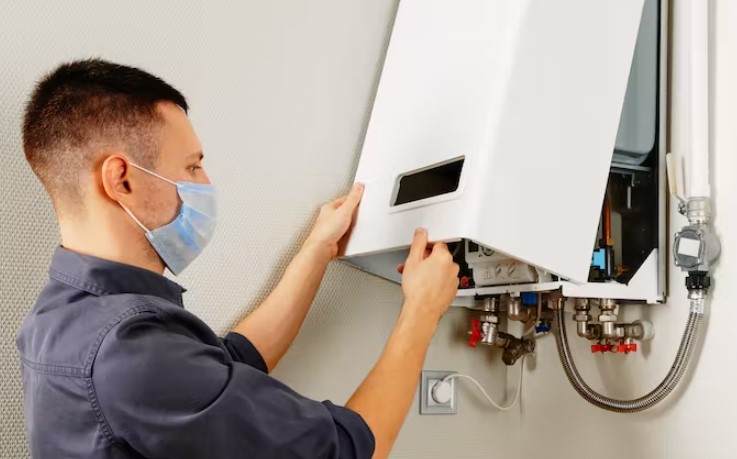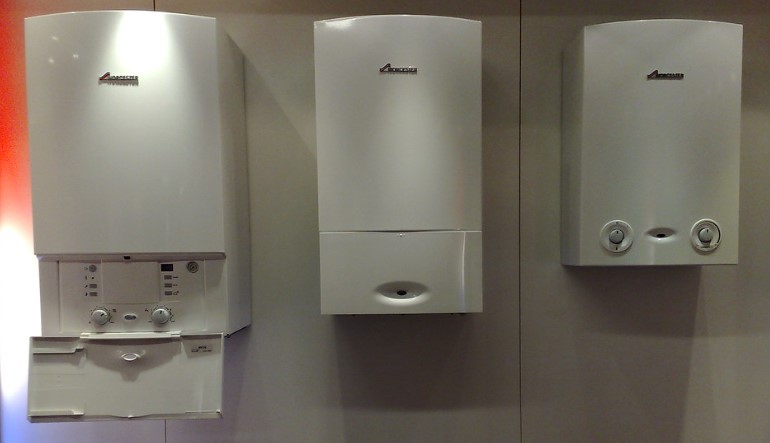Page Contents
Gas Boiler Replacement and Installation
Gas boiler replacement and installation involve the removal of an old or inefficient gas boiler and the installation of a new, more efficient model. The process typically includes an assessment of the existing heating system, selection of the appropriate size and type of gas boiler, removal of the old boiler, installation of the new boiler, electrical connection, commissioning, and ongoing maintenance.
The primary objective of gas boiler replacement and installation is to improve the heating performance and efficiency of a home or building, while also reducing energy costs and carbon emissions. Proper maintenance of the gas boiler after installation is also important to ensure its reliable and efficient operation over time. This can include annual maintenance checks, cleaning, and repairs as needed. With the right gas boiler replacement and installation, a home or building can enjoy reliable and cost-effective heating for many years to come.

Standard Gas Boiler
A standard gas boiler is a heating system that uses natural gas or propane as its fuel source to heat water and distributes it as steam or hot water throughout a building. These boilers are typically used in homes and buildings to provide heating and hot water for daily use. Standard gas boilers are efficient, reliable, and cost-effective, and they can be used in a variety of heating systems, including forced air and radiant heat.
They come in different sizes to meet the heating needs of different buildings, and they can be easily maintained and serviced. Standard gas boilers can provide a comfortable and cost-effective solution for heating homes and buildings, and they are a popular choice for many homeowners and building owners.
Gas Boiler Installation
Gas boiler installation is a complex process that involves several steps and requires professional expertise to ensure safe and efficient operation. Below are the steps involved in installing a standard gas boiler:
-
Site assessment and planning: Before installing a gas boiler, a qualified heating engineer or HVAC technician will assess the site to determine the best location for the boiler, and to ensure that it meets all safety and building code requirements.
-
Piping and ventilation: The gas boiler needs to be connected to a gas supply line and have proper ventilation to allow for the safe escape of combustion gases. A flue pipe is installed to carry combustion gases outside the building.
-
Boiler selection: Based on the site assessment and heating needs, the technician will select the right size and type of gas boiler that is suitable for the space.
-
Installing the boiler: The boiler is installed on a solid base and is securely fastened to the wall. The gas supply and flue pipes are connected to the boiler, and all joints are sealed to prevent gas leaks.
-
Electrical connection: The gas boiler requires an electrical supply to power the controls and safety devices. The electrical connection is made by a qualified electrician to ensure compliance with electrical codes.
-
Commissioning: After installation, the heating engineer will test the boiler to ensure that it is functioning properly and that all safety devices are working correctly. The engineer will also set the controls to the proper settings for optimal performance.
-
Maintenance: Regular maintenance is important to ensure the efficient and safe operation of the gas boiler. A qualified heating engineer should perform an annual maintenance check to ensure that the boiler is functioning properly and to catch any potential problems early.
Gas boiler installation is a complex process that requires specialized skills and knowledge. It’s important to have the installation performed by a qualified and experienced heating engineer or HVAC technician to ensure a safe and efficient system. Proper installation, maintenance, and operation of a gas boiler can help ensure that it provides reliable and cost-effective heating for many years to come.
Gas Boiler Replacement
Gas boiler replacement is a process in which an old or inefficient gas boiler is removed and replaced with a new, more efficient model. This can help improve the heating performance and efficiency of a building, as well as reduce energy costs and carbon emissions. Below are the steps involved in replacing a gas boiler:
-
Assessment: A qualified heating engineer or HVAC technician will assess the current heating system to determine the best replacement option and to ensure that the new boiler will be compatible with the existing system.
-
Boiler selection: Based on the assessment, the technician will select the appropriate size and type of gas boiler that meets the heating needs of the building.
-
Removing the old boiler: The old gas boiler is disconnected from the gas supply and flue pipe, and is carefully removed from the building.
-
Installing the new boiler: The new gas boiler is installed on a solid base and is securely fastened to the wall. The gas supply and flue pipes are connected to the boiler, and all joints are sealed to prevent gas leaks.
-
Electrical connection: The new gas boiler requires an electrical supply to power the controls and safety devices. The electrical connection is made by a qualified electrician to ensure compliance with electrical codes.
-
Commissioning: After installation, the heating engineer will test the new boiler to ensure that it is functioning properly and that all safety devices are working correctly. The engineer will also set the controls to the proper settings for optimal performance.
-
Maintenance: Regular maintenance is important to ensure the efficient and safe operation of the gas boiler. A qualified heating engineer should perform an annual maintenance check to ensure that the boiler is functioning properly and to catch any potential problems early.
Gas boiler replacement can significantly improve the heating performance and efficiency of a building, and can also help reduce energy costs and carbon emissions. It’s important to have the replacement performed by a qualified and experienced heating engineer or HVAC technician to ensure a safe and efficient system. Proper installation, maintenance, and operation of a gas boiler can help ensure that it provides reliable and cost-effective heating for many years to come.

Gas Boiler Types:
A gas boiler is a heating system that uses natural gas, propane, or butane to heat water or produce steam for heating a home or building. There are several types of gas boilers available for use in homes, including:
-
Conventional boilers: Also known as traditional boilers, conventional boilers are the most common type of gas boiler used in homes. They are designed to work with a separate hot water tank and are typically installed in older homes or those without the space for a combi boiler.
-
Combi boilers: Combi boilers are a type of gas boiler that provides both heating and hot water on demand, without the need for a separate hot water tank. They are a popular choice for homes with limited space, as they take up less room and are more energy-efficient than conventional boilers.
-
System boilers: System boilers are a type of gas boiler that also provide heating and hot water on demand, but they require a separate hot water tank. They are typically installed in larger homes or those with a higher demand for hot water.
-
Condensing boilers: Condensing boilers are a type of gas boiler that is designed to extract more heat from the flue gases produced during the combustion process, making them more energy-efficient than other types of boilers.